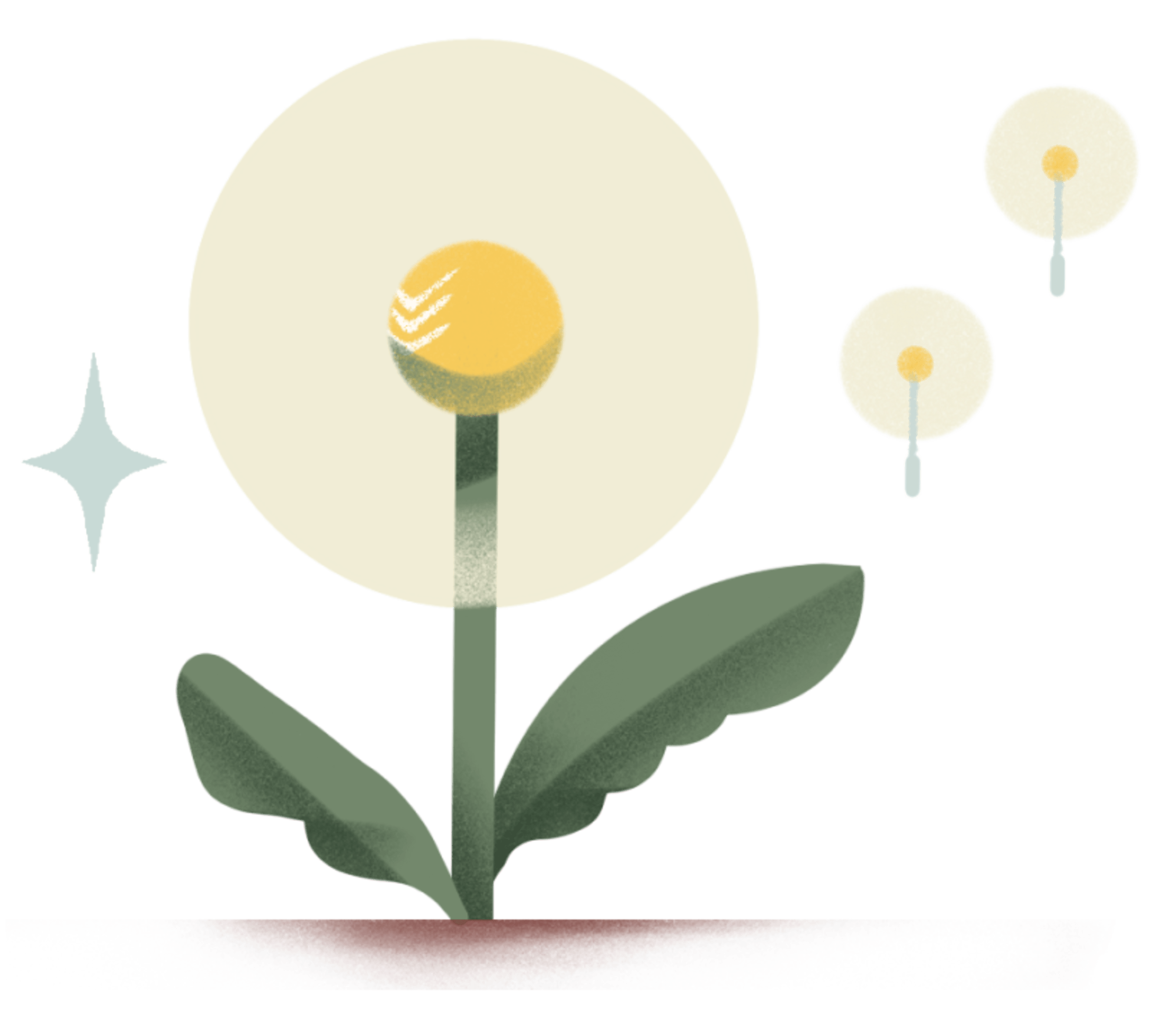Gina Trapani, best known for founding the popular productivity site Lifehacker, is a modern jack-of-all-trades. She writes, she podcasts, she codes, she starts and builds companies from nothing—all while starting and raising a family. And she somehow still makes the time to share her hard-won wisdom and experience with others in interviews like this one. I recently had a chance to chat with Gina about what her workday looks like and how she manages to fit everything in. Read on to get her thoughts on procrastination, how being a parent affects her work, and how she handles the pressure of running a two-person company.
On 'taking a new approach to sharing life hacks'
Gina was an English major in college, but she remembers when she first fell in love with technology:
I'm old, so the first time I saw a web page, I was in college. I didn't understand what I was looking at, but once I did, my little English major heart exploded. Anyone could publish online and anyone else could see it? I was beside myself. Then, when I learned how to make web pages, I was hooked.
As a software developer, Gina hadn’t had any professional writing experience before founding Lifehacker. She kept a personal blog, but launching a Gawker Media site was a whole new and nerve-wracking experience. Lifehacker took a new approach to sharing life hacks, which had already been popularized at the time by Merlin Mann’s 43 Folders. When lots of other media sites were bent on “tear[ing] stuff to pieces,” Gina made Lifehacker’s singular focus to “help our readers out, make their day a little easier.”
After four years of running Lifehacker—first as a team of one, and later as lead editor for a team of writers—Gina decided it was time to hand over the reins. Though she enjoyed her work on Lifehacker, she missed being in the trenches and getting her hands dirty. For someone who loves making things on the web, spending 100 percent of the time blogging about what other people are making is simply untenable.
On structuring a workday with multiple, varied projects
These days Gina keeps herself busy with creative projects. She’s building Makerbase, a “user-editable IMDb for apps.” She maintains her open-source to do list project, Todo.txt. And, she continues creating content through writing and podcasting. Gina and her co-founder, Anil Dash, have also recently started looking for a new home for their social media product, ThinkUp.
What does a typical workday look like for you?
Most of the week I work at home. One or two days I go to a coworking space to work alongside my cofounder and friends. I go deep into the zone when I’m coding or writing, so focused alone time is really important to me. But I also need to connect with other humans. So having that mix during a given week gives me the best of both worlds.
Usually I’m up around seven, help get my kid off to school, make a point of eating a good breakfast, head to the remote or my home office, and dive in. My team (and friends and family, actually) all use Slack. So I use that to keep in touch when I’m working alone.
Often I’ll go to the gym midday to get moving and sweat a bit. When I’m stuck on something, this is a great way to get some distance, take a break, and sometimes it helps spark a lightbulb moment. I’ll often return to my desk from the gym with a new perspective or a decision on how to go forward. I wrap up by five, pick up my kid, have dinner with my family, clean up, give her a bath, read her a story, and put her down to bed. After eight or so I can do a bit more work if I need to. Often I’ll use that time to wrap up any loose ends, answer email/Slack messages, and organize my todo list for the next day. Then I just chill out and spend time with my partner.
Generally weekdays are my workdays, unless there’s some unusual circumstance: we’re launching something, or doing a server migration that we’ve saved for a Saturday night, or I’m so excited about something I opt into working on it on a weekend, or something along those lines. On one hand, as a founder and someone responsible for keeping our applications working 24/7, I’m never truly off. But our team invested lots of time in creating stable systems that almost never unexpectedly need our attention.
It sounds like your normal workday runs on a fairly standard time schedule since you became a mom. Does that suit your internal body clock, or do you find you’re naturally more suited to being an early bird or a night owl?
Actually, keeping a standard workday schedule doesn’t suit my internal body clock. I’m naturally a night owl, so mornings can be tough for me, as is ending my workday on the early side. But everything is temporary. I’m adaptable, and while it’s not ideal to work against your body’s natural rhythms, I do believe you can shift your schedule when circumstances call for it with a bit of effort and mindfulness. I do still have to force myself to get to bed earlier in the evenings, but over time that became easier. And most of the time now, it’s just normal for me.
Lifehacker, your open source to do list project Todo.txt, ThinkUp, and Makerbase are all quite different. How has each of those projects changed what your typical workday is like?
Each of these projects has had a different daily cadence. At Lifehacker, we were publishing on the half hour all day long, so the pace was very quick, constantly on, grinding out content. At ThinkUp, there’s a handful of daily customer service to attend to, but longer stretches of development time on new insights, and a code deployment process and schedule. Makerbase requires some but not much community moderation and also longer stretches of development time to create and plan new features. I also try to write and speak (usually on podcasts) about what I’m working on, so there’s that documentation aspect of my work.
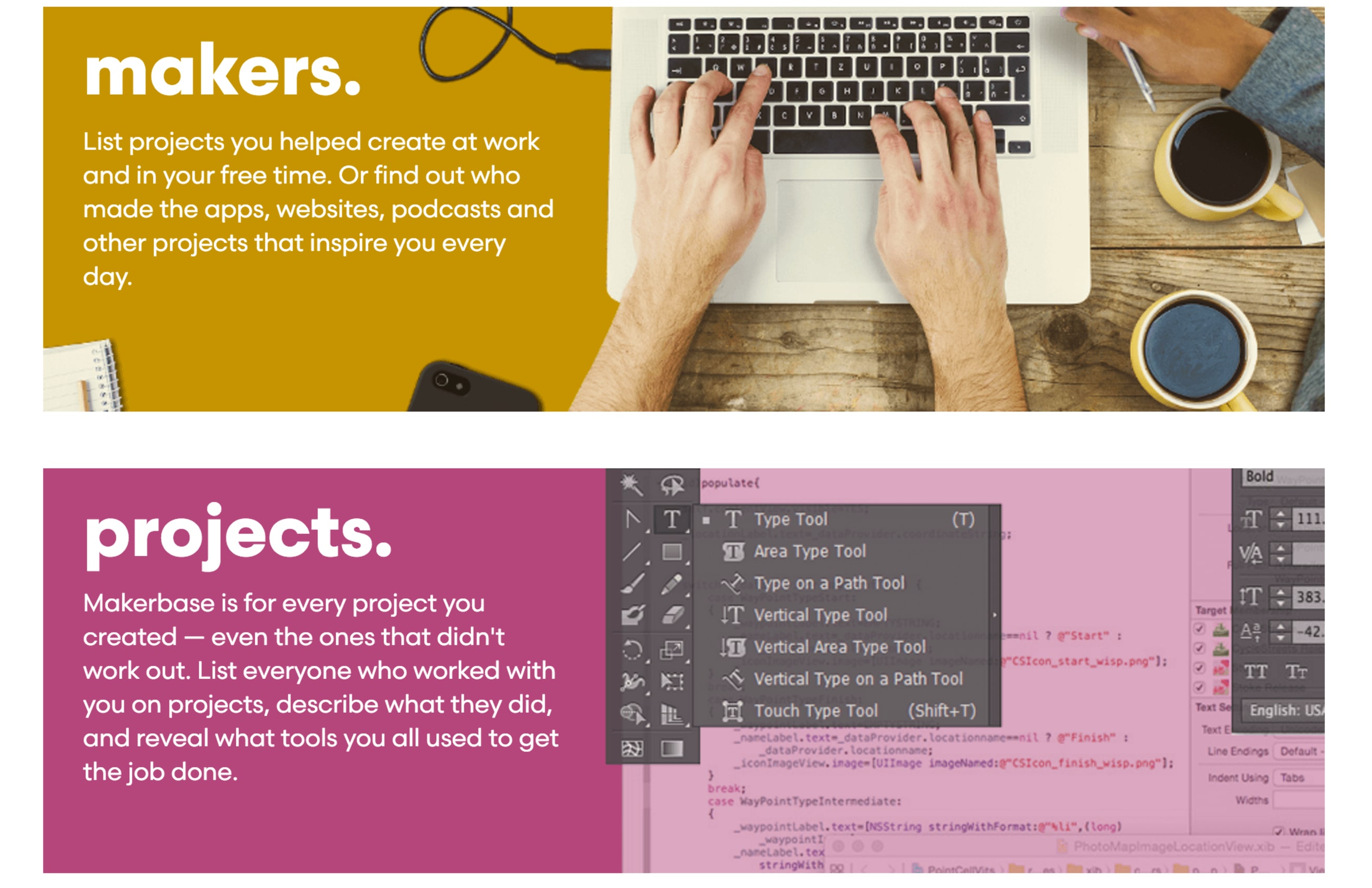
Has your workday changed over time for other reasons, besides the different projects you're working on? Have you made any changes to how you work deliberately?
Ever since I became a parent, I’ve had to compartmentalize my work into regular business hours as much as possible, because when my toddler is waiting for me to pick her up at school, I’ve got to put down what I’m doing and go. So parenthood has introduced a lot of structure and deadlines into my daily routines. It requires that I work smarter, and creates urgency around getting focused on the task at hand and getting it done. The clock is always ticking.
My work days vary by location and project, but the one thing I try to do every day is create uninterrupted blocks of time to get stuff done. I’ve learned I’m not very good at multi-tasking. Switching between a conference call and coding back to a meeting costs me dearly in time and wasted effort. So I schedule calls and meetings in blocks. When I can, I put aside whole days for them and use the rest of the time to go heads down and focus. That means I log off Twitter, close Slack, and sometimes, when I’m on a serious deadline, I set a timer on my phone for somewhere between 45 or 90 minutes, and make an agreement with myself to work on nothing else but the task at hand until the timer goes off.
As I’ve gotten older, I’ve also realized that self-care (or lack thereof) deeply affects my work. If I eat well, sleep well, exercise regularly, and prioritize caring for myself when I’m not feeling well, I can think more clearly, and I have more patience, motivation, and ability to focus.
What elements make up a really great day for you?
For me, a really great day includes a good night’s sleep, coding, writing, exercise, lunch with a friend or collaborator, dinner with my family, and playing with my kid. Most days I don’t get to do all of that, but I try to make sure every day has at least some of those things.
How do you plan for mid/long-term work? Do you use goals, todo lists, regular reviews?
I use a three-tier system: goals, projects, and a todo list. Goals determine projects, and projects determine todos (in GTD parlance, next actions). I do Friday weekly reviews of which projects I made progress on that week, what goals they’re attached to, and what I’d like to focus on the coming week, and I prioritize tasks based on that. At the end of each day, I queue up the todos I’d like to focus on the next day. That helps me “park on a downward slope” so to speak. When I begin my day, I know exactly what I’m doing and why, and I can just get started.
This method is probably too overwrought and systematized for many people, especially people with a more spontaneous nature. For me, goal/project/task review and organizing my todo list is a form of anxiety management and stress relief. When I’m feeling overwhelmed by how much there is to do for long-term work, having a plan calms me down because it makes me feel like I’m on the right path.
On getting involved in podcasting—'it was absolutely terrifying'
I first discovered Gina many years ago, when I started listening to podcasts for the first time. Gina was a regular host on "This Week in Google," along with Leo Laporte and Jeff Jarvis. I soaked up their conversations, and appreciated their perspectives on changes at Google, and how technology is shaping our world.
Since then, Gina joined the "All About Android" podcast, also on Leo Laporte's TWiT network. And she hosted 76 episodes of "In Beta" on the 5by5 network. Here's what she had to say about how podcasting fits into her workday:
You do quite a bit of regular podcasting. How do you fit that into your workday?
I do two shows regularly: "This Week in Google" and "All About Android," both on the TWiT network. I co-hosted these shows for years on a weekly basis. Then last year I changed my schedule to once a month. I was finding it difficult to balance my work as a founder and a weekly podcaster. TWiT is a very mature network, and their shows are on a fixed schedule. So when I’m going to do an episode I know exactly when that will be, and I work it into my week’s schedule ahead of time.
I do get asked to appear on other shows occasionally, which is very flattering, and I schedule those shows on an ad hoc basis, depending on how busy I am. I love podcasting, but I do see it as an “extra” thing I do on the side, and generally I prioritize my company’s work over it.
How did you first get involved in podcasting?
When I left Lifehacker, I was pretty burned out on blogging. I’d saved up some money, and I didn’t have another full-time job lined up because I wanted to take some time to experiment with new forms of media and new coding projects. During that time Leo Laporte of TWiT reached out to me about appearing on their show, "This Week in Tech." That show is huge. It is consistently one of the top 10 tech podcasts on iTunes. And it wasn’t just an audio podcast. It was live, streaming video, no edits, just live to tape, with a giant IRC chat room going during the broadcast. In other words, it was absolutely terrifying. But I decided to try it anyway. Then, thanks to Leo, I never stopped.
On starting ThinkUp, a new kind of social media analytics company
Gina's current focus is the company she founded with Anil Dash. Together they run ThinkUp, an analytics service for your personal social media accounts, and Makerbase, a directory of products and the people who build them.
ThinkUp is a service that offers social media analytics for people, rather than companies. It doesn't focus on how many clicks your tweets get. Instead, it tells you things like how much you talk about yourself in your tweets and highlights changes in the Twitter bios of people you follow.
After a successful crowdfunding campaign to get the subscription service up-and-running, growth was slow. Gina and Anil found they weren’t able to support a team beyond themselves. They recently made the decision to find a new home for ThinkUp.
Their second product, Makerbase, is designed to give credit to all the people who bring products to life—beyond founders or CEOs who tend to get most of the attention—and to show the trajectory of teams who’ve tried several products before finding success.
Gina says Makerbase was initially Anil’s idea, “an idea he’s talked to me about since 2011.” They started working on Makerbase as a “20 percent project," spending Fridays on it until they had a working prototype. These days Makerbase is live, and is editable by anyone, so Gina and Anil have to work hard on ensuring the site’s contributions are high-quality.
With one product looking for a new home, there’s still a lot to do between a team of two. I asked Gina about how she and Anil manage their workload day-to-day.
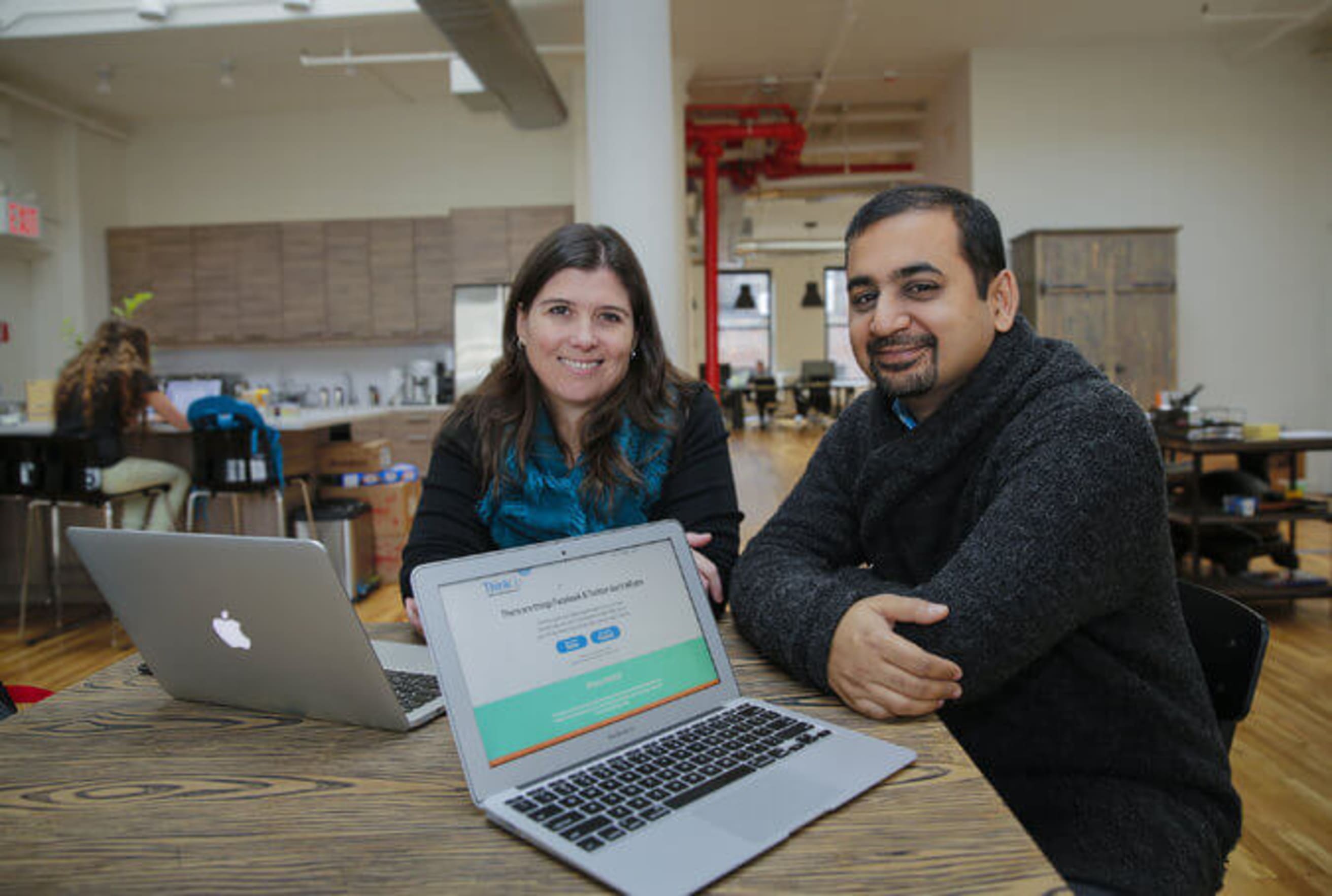
You're working in a two-person company now, so you both must wear a lot of hats. How do you distribute the workload between you for ThinkUp and Makerbase?
One of the nice things about being in a two-person company is you can really improvise and work on things ad hoc. There are times when ThinkUp requires more attention (like during our Best of 2015 year-end insight run). Or we’re focusing on a new Makerbase feature. For each product, we have our “must do by [deadline]” lists, and our “would like to build when we have time” lists. We prioritize each depending on what the calendar looks like.
How do you deal with the pressure of being one of two people holding up your company?
My cofounder and I deal with stress differently. In stressful times, he is extremely optimistic, while my brain goes to the worst case scenario by default. That’s sometimes difficult, but it works too. We ground each other. He makes me realize I’m catastrophizing, and (I like to think) I help him be more realistic.
On the importance of the physical workspace
Your physical workspace can make a big difference to your mindset at work. As a fan of series like Lifehacker's "How I Work" and "The Sweet Setup"'s interviews, I love seeing other people's workspaces.
Gina shared the following details with me about her space.
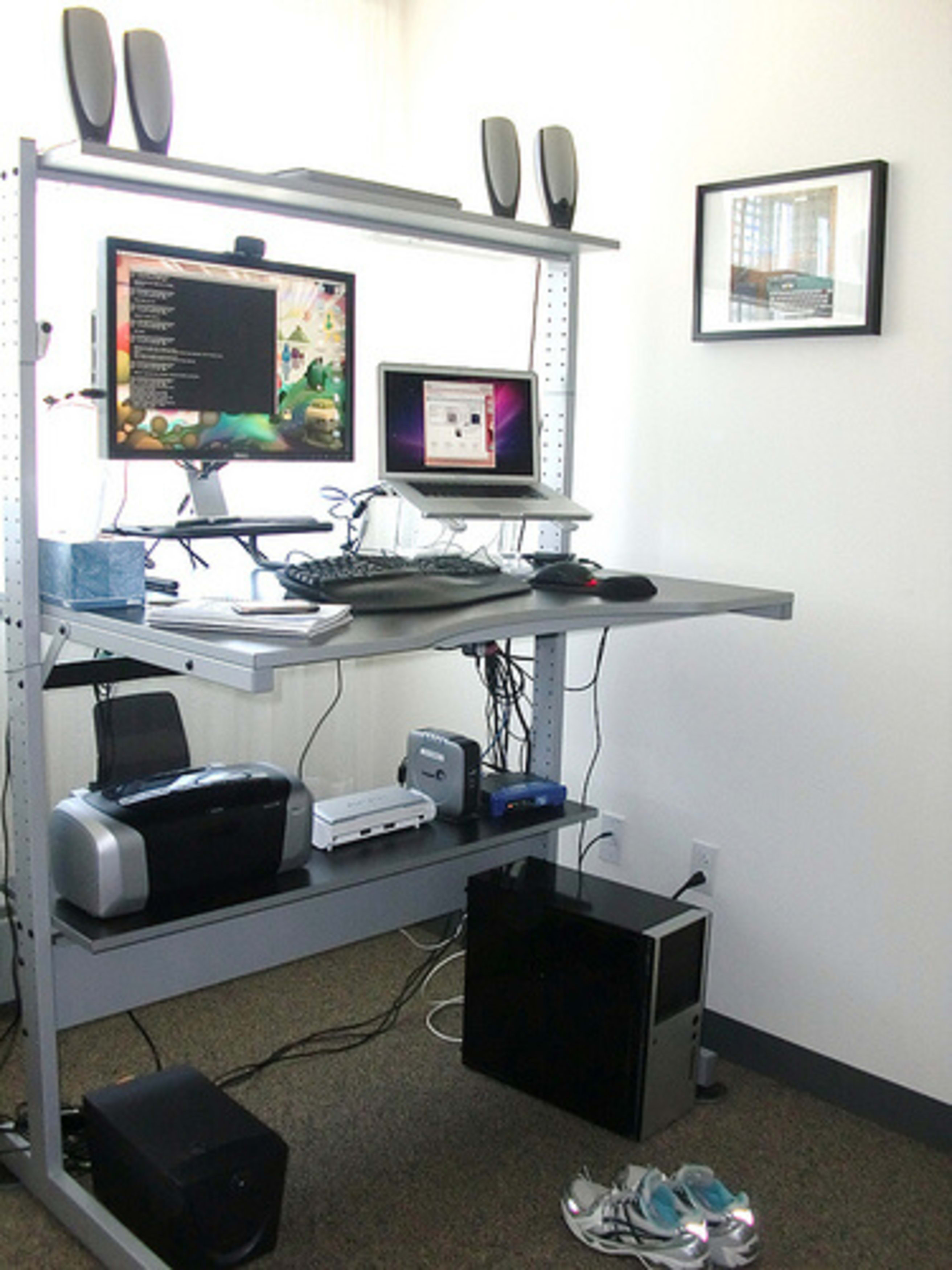
What’s your favorite thing about your workspace, and why?
Virginia Woolf famously said, “a woman must have money and a room of her own if she is to write fiction.” I don’t write fiction, but I’m sure Woolf would have said the same about women who write software. So, my favorite thing about my workspace is that it’s mine.
What’s the first thing you normally do when you get to your desk?
By the time I get to my desk, I’ve already checked my phone for any urgent emails, server alerts, chats from my cofounder, etc., so I know nothing’s on fire. The first thing I do at that point is look at my todo list. [I ask] what’s the most important thing I’ve got to accomplish today? If I’m in the right state of mind and not procrastinating on something for whatever reason, I get started and try really hard to avoid distractions like Twitter or Facebook or chats with friends.
On overcoming a bad day at work, fighting procrastination, and other advice
I always love to hear other people's strategies for improving a bad day at work, or overcoming bad habits. I'm a procrastinator myself, so it's a relief to hear that other successful people procrastinate as much as I do.
Here is what Gina said about her strategies for getting more done when things aren't going well.
What do you do when you feel overwhelmed with work, or your day is otherwise going badly? Do you have a go-to method for “resetting” your day?
If the weather’s okay, I take a walk outside. Sunlight and a brisk walk almost always reset my attitude on a tough day. If the weather’s bad and I’ve got time, I go to the gym. When I don’t have that kind of time, deep breaths, a glass of ice water, or a hot cup of green tea. If it’s the task at hand that’s crushing my spirit, I switch to something else for awhile. As a programmer I’ve learned the only thing to do when you hit a wall with a bug is to step away from it for awhile.
How do you balance the different roles or types of work you need to do on an average day?
I try not to think about my various projects and roles as competing priorities. In fact, they’re all connected. If I’m spending a couple of hours learning a new coding language or tool, for example, that’s an investment in me, in my skills. It’s also an investment in my business and/or my community, because those are skills I can use at work or in some kind of community service role. [This] in turn is an investment in my family, because my business supports my family, which is an investment in my future. Everything is connected. Even the more mundane tasks, like customer support, or doing my taxes, or getting to the dentist, all support my personal and professional goals in some way, if I’m doing the right stuff. So it’s less about balancing and more about integrating various projects in the right way.
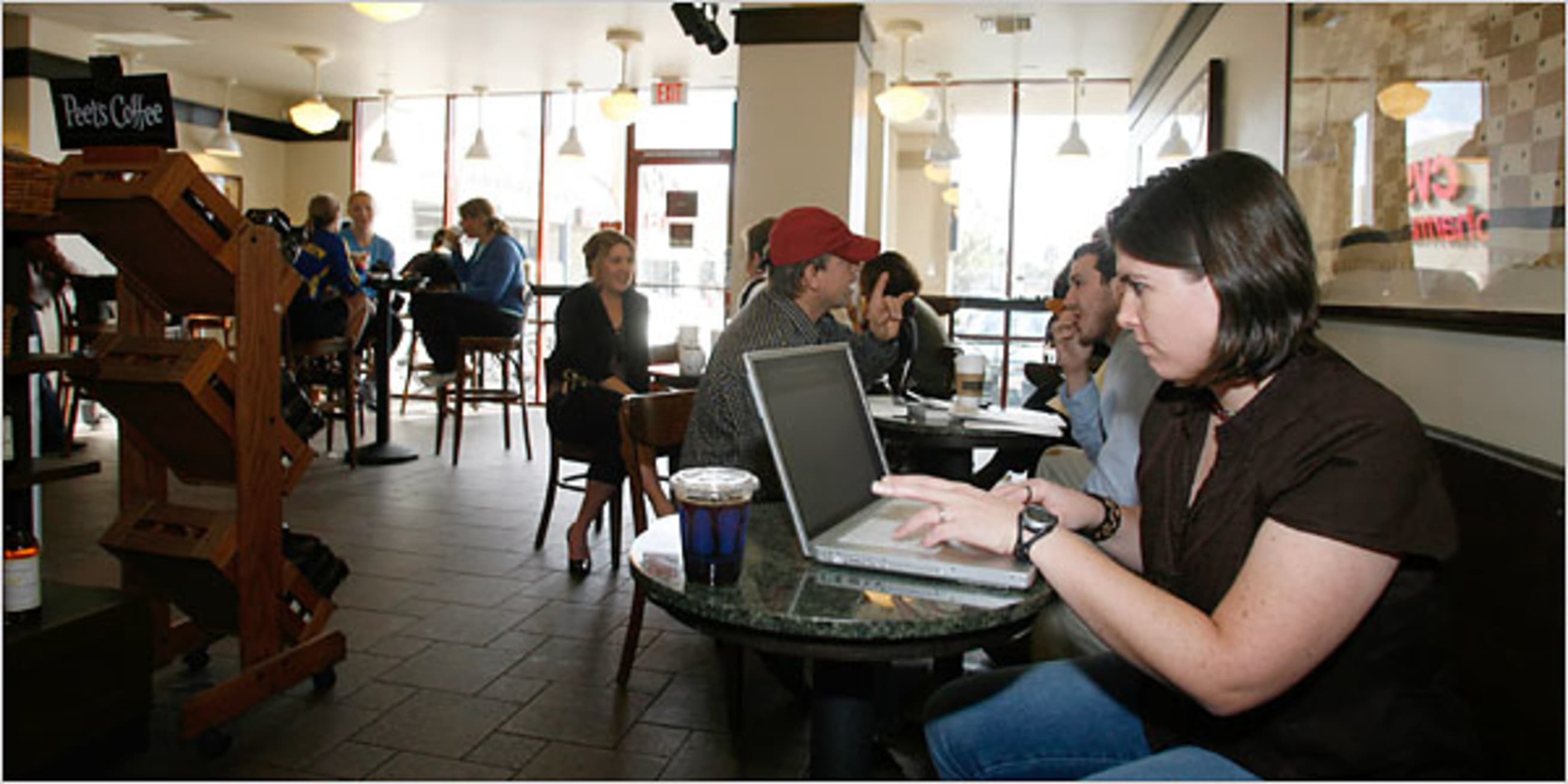
Do you procrastinate much? If so, how do you overcome that when you need to hit a deadline?
Oh dear yes. I’m pretty much in a constant state of procrastination. In fact, I’m procrastinating right now! (I’d much rather be doing this interview than that other thing I have to do today.) And that’s how I usually deal with procrastination. I try to use the energy I’m expending avoiding one thing to move ahead another. I don’t have time to be doing nothing at all.
This technique doesn’t work as well when you’re on a hard deadline. When I’m in that situation, I try a couple of approaches. First, I try to figure out what my mental block is and try to rationalize my way out of it. What is the root of the dread? Talking about that with a human I trust can help. Second, I’ll try to break down the thing I have to do into the smallest atomic units. If it’s a writing assignment, I try to make writing the next sentence, the next paragraph, the goal. If I can do that, I can celebrate. I’ve got movement, and things in motion want to stay in motion. Finally, if I’m desperate, I settle for good old fashioned bribery. If I get so much done, then I get some sort of reward.
Do you have any other “bad” work habits you have to work around?
I overthink things. As an engineer, my brain is trained to think of everything that can go wrong. And that means I can fall into the trap of spending time on premature optimizations. I’m also a perfectionist, so it’s uncomfortable for me to publish or ship something I don’t think is completely perfect. To deal with that, I always try to remember: nothing is ever perfect, and that’s okay.
Gina works on many different projects. Somehow she manages to keep it all together and accomplish things. It's inspiring to see how much she has accomplished. And it is humbling to know that even the founder of Lifehacker struggles with procrastination and managing her workload.
If you think your bad habits doom you, hopefully Gina's story encourages you not to be too hard on yourself. See each small step forward as a victory—even if it's only one more sentence or one small line of code. That's how makers like Gina get things done.

